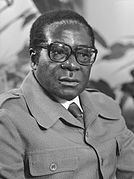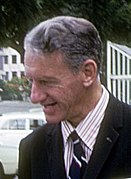Our website is made possible by displaying online advertisements to our visitors.
Please consider supporting us by disabling your ad blocker.
Geneva Conference (1976)
The Geneva Conference (28 October – 14 December 1976) took place in Geneva, Switzerland during the Rhodesian Bush War. Held under British mediation, its participants were the unrecognised government of Rhodesia, led by Ian Smith, and a number of rival Rhodesian black nationalist parties: the African National Council, led by Bishop Abel Muzorewa; the Front for the Liberation of Zimbabwe, led by James Chikerema; and a joint "Patriotic Front" made up of Robert Mugabe's Zimbabwe African National Union and the Zimbabwe African People's Union led by Joshua Nkomo. The purpose of the conference was to attempt to agree on a new constitution for Rhodesia and in doing so find a way to end the Bush War raging between the government and the guerrillas commanded by Mugabe and Nkomo respectively.
The Geneva Conference had its origins in the South African "détente" policy instituted in late 1974, and more directly in the peace initiative headed by the United States Secretary of State, Henry Kissinger, earlier in 1976. After the Kissinger plan was rejected by the nationalists, talks were organised in Geneva by Britain to try to salvage a deal. The proceedings began on 28 October 1976, eight days behind schedule, and were chaired by a British mediator, Ivor Richard, who offended both delegations before the conference even started. When Richard read an opening statement from British prime minister James Callaghan which referred to the country as "Zimbabwe", the nationalists were somewhat placated, while Smith's team was insulted yet further. Little progress was made during the two sides' discussions, causing the conference to be indefinitely adjourned on 14 December 1976. It was never reconvened.
Previous Page Next Page




